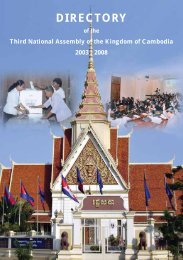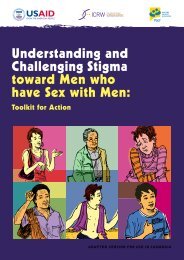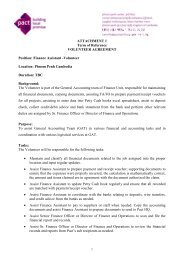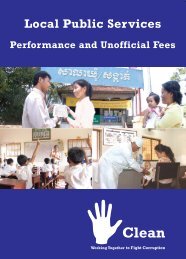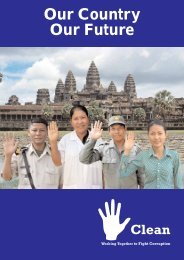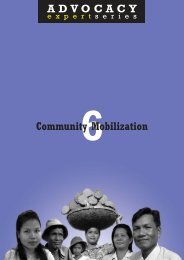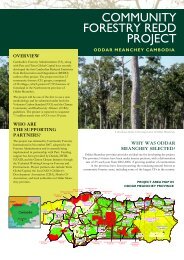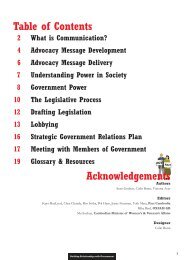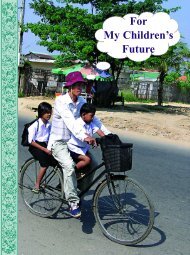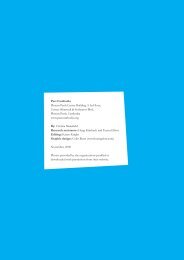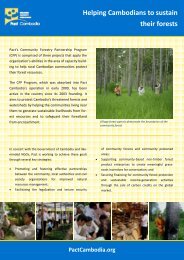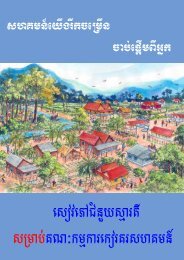Advocacy in Cambodia: Increasing Democratic ... - Pact Cambodia
Advocacy in Cambodia: Increasing Democratic ... - Pact Cambodia
Advocacy in Cambodia: Increasing Democratic ... - Pact Cambodia
Create successful ePaper yourself
Turn your PDF publications into a flip-book with our unique Google optimized e-Paper software.
literature, <strong>in</strong>terviews, and field visits is that no<br />
amount of legislation or directives from the central<br />
government can <strong>in</strong>still political will with<strong>in</strong><br />
prov<strong>in</strong>cial authorities to solve fisheries disputes.<br />
Enforcement at the prov<strong>in</strong>cial level cont<strong>in</strong>ues to<br />
be a problem and powerful local <strong>in</strong>terests are<br />
<strong>in</strong>hibit<strong>in</strong>g food security. Even when political will<br />
exists, the DoF does not have the means to<br />
implement policies, <strong>in</strong>clud<strong>in</strong>g the community<br />
fisheries program. Most disputes are not be<strong>in</strong>g<br />
solved and despite the pass<strong>in</strong>g of the sub-decrees<br />
releas<strong>in</strong>g concession lots, communities are not<br />
much closer to rega<strong>in</strong><strong>in</strong>g access to fish<strong>in</strong>g<br />
resources. NGO staff and community activists are<br />
often afraid to push for local enforcement, and the<br />
risks they face regard<strong>in</strong>g their personal well-be<strong>in</strong>g<br />
are very real.<br />
<strong>Democratic</strong> Space<br />
Despite poor enforcement performance,<br />
advocacy efforts are contribut<strong>in</strong>g positively to the<br />
enlargement of democratic space <strong>in</strong> <strong>Cambodia</strong>.<br />
Strategies used by NGOs and communities have<br />
brought fisheries violations to the attention of<br />
ma<strong>in</strong>stream society. Discussion of disputes is<br />
common and civil society activists are becom<strong>in</strong>g<br />
more confident about rais<strong>in</strong>g issues and<br />
identify<strong>in</strong>g violators. Although people are still<br />
afraid, they are no longer silenced by their fear.<br />
<strong>Advocacy</strong> Capacity Build<strong>in</strong>g<br />
In general, NGOs and communities are<br />
becom<strong>in</strong>g more confident <strong>in</strong> advocat<strong>in</strong>g for<br />
communities’ rights to fish<strong>in</strong>g resources. They are<br />
becom<strong>in</strong>g skilled <strong>in</strong> document<strong>in</strong>g fisheries<br />
compla<strong>in</strong>ts, identify<strong>in</strong>g violations, prepar<strong>in</strong>g and<br />
defend<strong>in</strong>g court cases, organiz<strong>in</strong>g forums, and<br />
dissem<strong>in</strong>at<strong>in</strong>g <strong>in</strong>formation.<br />
At the national level, NGOs are rapidly<br />
accumulat<strong>in</strong>g experience and becom<strong>in</strong>g well<br />
organized. For example, when a new version of<br />
the draft community fisheries law is released to<br />
NGOs, the drafts are translated <strong>in</strong>to English and<br />
both the Khmer and English versions are<br />
distributed electronically around the country (and<br />
abroad) with<strong>in</strong> a week. In this manner, people who<br />
are monitor<strong>in</strong>g or have a vested <strong>in</strong>terest <strong>in</strong> the<br />
outcome of the f<strong>in</strong>al draft can be <strong>in</strong>formed about<br />
where legislation stands and can use current<br />
<strong>in</strong>formation to advocate as opportunities arise, for<br />
example when officials visit the prov<strong>in</strong>ces.<br />
NGOs <strong>in</strong> the prov<strong>in</strong>ces are also becom<strong>in</strong>g<br />
more skilled <strong>in</strong> handl<strong>in</strong>g compla<strong>in</strong>ts and becom<strong>in</strong>g<br />
more vocal <strong>in</strong> their advocacy. NGOs now regularly<br />
<strong>in</strong>struct communities <strong>in</strong> the fil<strong>in</strong>g of compla<strong>in</strong>ts.<br />
However, as communities become more frustrated<br />
about the lack of concrete progress by the<br />
government, NGOs are f<strong>in</strong>d<strong>in</strong>g themselves at a loss<br />
with how to proceed with <strong>in</strong>creased conflict at the<br />
local level.<br />
Fisheries advocates are unanimous <strong>in</strong> their<br />
op<strong>in</strong>ion that dispute resolution efforts have rarely<br />
resulted <strong>in</strong> resolutions favorable to fish<strong>in</strong>g<br />
communities. When resolution has occurred, it<br />
has usually been because community members<br />
feel so threatened that they have taken direct<br />
action. To illustrate, <strong>in</strong> one case <strong>in</strong> Kompong<br />
Chhnang, there was a problem with a fish<strong>in</strong>g lot<br />
owner who had was illegally pump<strong>in</strong>g water out<br />
of a pond <strong>in</strong> order to catch the fish. Villagers filed<br />
compla<strong>in</strong>ts but there was no response. F<strong>in</strong>ally,<br />
they decided to remove the illegal pump<br />
themselves and give it to the Department of<br />
Fisheries. Faced with actual evidence (the illegal<br />
pump), it was difficult for local authorities to deny<br />
that illegal action was tak<strong>in</strong>g place. In addition,<br />
the lot owner was reluctant to claim the pump<br />
s<strong>in</strong>ce he would then have to admit to illegal<br />
activity.<br />
Anecdotal evidence <strong>in</strong>dicates that similar<br />
<strong>in</strong>cidences of direct action are steadily <strong>in</strong>creas<strong>in</strong>g<br />
around the country. Advocates of direct action<br />
argue that it is only when people beg<strong>in</strong> tak<strong>in</strong>g the<br />
law <strong>in</strong>to their own hands that the government will<br />
be forced to address the currently deplorable<br />
fisheries situation. It is important to po<strong>in</strong>t out that<br />
this change <strong>in</strong> situation (from advocacy to direct<br />
action) presents important challenges for<br />
development workers - how to balance for<br />
At the national level,<br />
NGOs are rapidly<br />
accumulat<strong>in</strong>g experience<br />
and becom<strong>in</strong>g well<br />
organized. For example,<br />
when a new version of<br />
the draft community<br />
fisheries law is<br />
released to NGOs, the<br />
drafts are translated<br />
<strong>in</strong>to English and both the<br />
Khmer and English<br />
versions are distributed<br />
electronically around<br />
the country (and abroad)<br />
with<strong>in</strong> a week.<br />
Case Studies<br />
51



